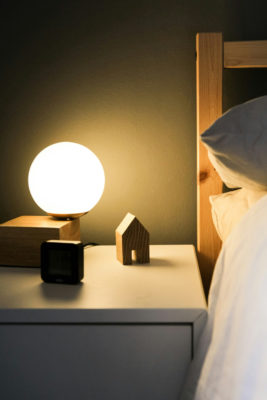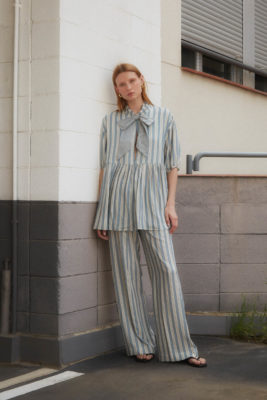
What Your Chronotype Can Tell You About Your Sleep Habits
By
5 months ago
Inside TikTok's latest wellness trend
The one thing we crave most of all? A good night’s sleep. This makes the rest – and the science behind it – all the more intriguing for the wellness-wise amongst us. The latest sleep theory doing the rounds on TikTok is all about finding (and supporting) your chronotype, in the hopes it can help improve energy levels, health and more. But does it work? We ask the experts.
What Is A Chronotype?
Your chronotype essentially refers to your natural propensity for sleep and wakefulness at particular times during a 24-hour period. A behavioural manifestation of an underlying circadian rhythm, it’s largely determined by genetics – in particular the PER3 circadian clock gene.
‘Ever wondered why some people are early birds while others thrive at night? These tendencies are part of what’s known as your sleep chronotype,’ says Martin Seeley, a sleep expert at MattressNextDay. ‘Chronotypes reflect an individual’s natural preference for the timing of daily activity and rest – like being a “morning person” or “night owl”. It can significantly impact your sleep quality, energy levels, performance, health and overall happiness.’
@healthwithcory 😴 Which one are you? 👉 Keep in mind, chronotypes are not based off when you may be forced to wake up due to work, school, children, etc but rather what time your body would prefer to sleep and wake if you had nothing in the way. 🦁 Lion chronotypes are essentially early birds who thrive off early mornings, but are packing it in quite early at night. 🐻 Bear chronotypes sit right in the middle and don’t go to bed too early or too late. They are generally outgoing and they fit into what the typical 9-5 work schedule is built around. 🐺 Wolf chronotypes are essentially night owls and they are able to get more done at night when the lion chronotypes are ready to pass out. I know several artists who fall into this category. 🐬 Dolphin chronotypes have a tough time with sleep schedules and may deal with some insomnia as well. They really don’t fit into any pattern for the most part. #sleep #sleeping #sleepaid #sleepy ♬ original sound – Cory Rodriguez
How To Find Your Sleep Chronotype
Lion
The first sleep chronotype is an early riser. ‘Lions feel most energized in the morning, peaking around 9am, and often experience a mid-afternoon slump around 2pm,’ says Martin. ‘They typically go to bed early to recharge for the next day.’
Bear
Most of us, however, are bears. ‘Making up about 55 percent of the population, bears follow a traditional schedule, waking at 7am and feeling most productive from 10am to 2pm,’ Martin tells us. ‘They maintain a balanced social life and usually go to bed around 11pm.’
Wolf
And then we have the late-night wolves. ‘Night owls who sleep in until 8am and are at their best in the afternoon and evening,’ explains Martin. ‘Wolves, known for their creativity, make up 15 to 20 percent of the population and often stay up late into the night.’
Dolphin
Not sure you fit into any of the above categories? Then you might be a dolphin. According to Martin, ‘these individuals often struggle with irregular sleep patterns, sometimes resembling insomnia. Dolphins are light sleepers who may feel tired throughout the day but remain alert at unpredictable times.’
Is There A Science Behind It?
In short, yes. Much of the explanation behind sleep chronotypes comes from studies on circadian rhythms and genetics. ‘Your chronotype is influenced by genetics and your circadian rhythm,’ explains Martin. ‘This internal clock not only dictates when you prefer to wake up and go to bed but also affects your appetite, core body temperature, and when you feel most productive. Some theories suggest our varying chronotypes evolved for survival, with different sleep patterns helping protect communities from predators.’
@onlyjayus Whats Your Type? 💤 #fyp #sleep #sleepfacts #dreams #luciddreaming #earlybird #nightowls #chronotypes #personalitytest #learnontiktok #edutok #onlyjayus ♬ original sound – Bella Rose
How To Optimise Your Sleep Schedule, Based On Your Chronotype
Once you know your chronotype, you can then align your sleep schedule with your body’s natural rhythm. The result? Hopefully, better sleep. Here are some tips to get you started:
- Bears: Follow a solar schedule, sleeping and waking with the sun.
- Lions: Go to bed early and wake up early.
- Wolves: Go to bed later and wake up later.
- Dolphins: Maintain a consistent sleep schedule to combat insomnia
And remember, it’s important to stick to a consistent sleep schedule – even on weekends – to reinforce your natural circadian rhythm.
Can You Change Your Sleep Chronotype?
It might be a tough adjustment, but you can shift your sleep perspective with small tweaks here and there. ‘While your chronotype is largely determined by biology and can’t be completely altered, you can make adjustments to align your lifestyle with your natural rhythms,’ confirms Martin. ‘If you’re not a morning person but need to function early, adopting structured bedtime routines and healthy sleep habits can help. Small tweaks, like a consistent wind-down routine or avoiding late-night screens, can improve your overall sleep quality.’
Featured image: Ron Lach, Pexels










